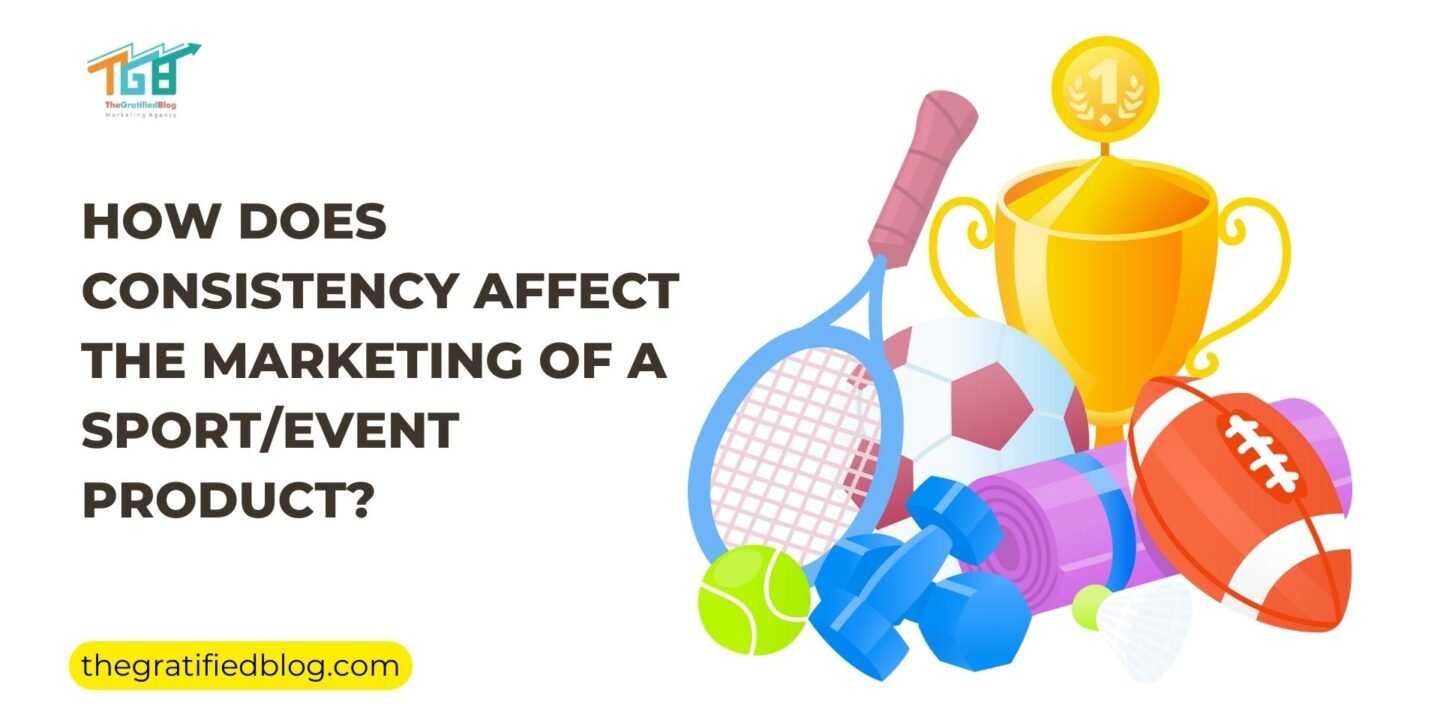
Consistency is a crucial factor in marketing any sport or event product. It creates a sense of reliability and trust among consumers, leading to brand loyalty and repeat business. Consistency in marketing messages, branding, and customer experience ensures that consumers know what to expect from a product and can easily recognize and identify with it. This blog post will explore how does consistency affect the marketing of a sport/event product and discuss the importance of consistency in marketing and how it impacts consumer perception and behavior.
The Importance Of Consistency In Marketing
Consistency is pivotal for the success of marketing a sport or event product. By upholding a uniform approach across all marketing endeavors, companies can forge a robust brand image, imparting a perception of professionalism and reliability to consumers. This consistency can be achieved through various means, such as using consistent messaging, visuals, and tone of voice in all marketing materials.
Additionally, ensuring a seamless customer experience at every touchpoint, from advertising to purchasing and post-purchase support, is essential. Consistency cultivates trust and fosters customer loyalty, reassuring consumers that the product will consistently meet their expectations.
Ultimately, a consistent marketing strategy strengthens the overall positioning of a sport or event product, making it more likely to attract and retain consumers.
How Does Consistency Affect The Marketing Of A Sport/Event Product?
Consistency plays a crucial role in the marketing of a sport or event product in several ways:
- Brand Identity
- Trust And Credibility
- Customer Engagement And Retention
Let’s delve into the details of the role mentioned above.
Consistency And Brand Recognition

Consistency in marketing helps build a strong brand image and contributes to brand recognition. When a sports or event product is consistently marketed with the same messaging, visuals, and tone of voice, it becomes easily recognizable to consumers. This leads to increased brand awareness and familiarity, which in turn can have a positive impact on sales and customer loyalty.
Organizations can establish a unified and unforgettable brand identity by consistently displaying the brand’s logo, colors, and other visual elements across different marketing channels. This consistency helps consumers quickly associate the brand with the product and its values.
Moreover, when consumers consistently have positive experiences with a brand, they are more likely to remember it and choose it over competitors. This is especially true in the sports and event industry, where emotions and personal connections often drive consumer loyalty.
Consistency establishes a sense of professionalism and reliability and contributes to brand recognition and customer loyalty. By maintaining a consistent marketing strategy, companies can increase brand awareness, foster customer trust, and ultimately drive the success of their sports or event products.
Building Trust And Credibility

Building trust and credibility is another crucial aspect of how consistency affects the marketing of a sports or event product. This is important in the sports and event industry, where consumers rely on the brand for quality experiences and products.
Consistency in marketing activities, such as delivering consistent customer service, messaging, and product quality, helps build consumer trust and credibility. It shows that the brand is reliable, enhancing the overall customer experience.
Additionally, consistency in marketing efforts helps to establish the brand as an authority in the industry. When a brand consistently provides valuable and informative content related to its sports or event product, it positions itself as a trusted source of information. This builds credibility and can attract a loyal following of consumers who trust the brand’s expertise.
Building trust and credibility through consistency in marketing is essential for the success of a sports or event product. By consistently meeting customer expectations, providing valuable content, and establishing authority in the industry, the brand can foster strong relationships with consumers and drive long-term success.
Engaging And Retaining Customers

Engaging and retaining customers is another crucial factor impacted by consistency in marketing a sports or event product. It creates a positive customer experience that encourages customers to engage further with the brand. Consistency in marketing activities, such as consistently delivering valuable content and consistently providing exceptional customer service, keeps customers engaged and interested.
Moreover, consistency in marketing efforts helps to retain customers by continuously meeting their expectations. A brand can establish a loyal customer base by engaging and retaining customers through consistent marketing. This word-of-mouth marketing can attract new customers and expand the brand’s reach. Consistency in marketing plays a significant role in engaging and retaining customers for a sports or event product.
Strategies For Engaging And Retaining Customers
Here are some effective strategies for engaging and retaining customers of a sports/event product:
Deliver Exceptional Experiences
- Live Events: Ensure that the live event experience exceeds expectations. This includes providing excellent facilities, amenities, and entertainment options and ensuring smooth logistics and customer service.
- Digital Engagement: Create immersive digital experiences for customers who cannot attend in-person events. This could include live streaming of events, interactive fan engagement activities, and exclusive digital content.
Personalization and Customization
- Tailored Communication: Segment customers based on their preferences, behaviors, and demographics and tailor communication and marketing efforts accordingly. Personalized emails, offers, and recommendations can help strengthen the relationship between the organization/event and its customers.
- Customized Experiences: Offer customizable experiences that allow customers to personalize their interactions with the sport/event product. This could include options such as choosing preferred seating arrangements, selecting merchandise designs, or participating in interactive activities.
Continuous Engagement Beyond Events
- Off-Season Activities: Maintain customer engagement during the off-season by organizing events, competitions, or digital content releases to keep them connected and interested in the sport/event product year-round.
- Educational Content: Provide educational content related to the sport/event product, such as tutorials, insights from athletes or experts, and historical highlights. This helps deepen fans’ understanding and appreciation of the sport/event.
Feedback and Listening
- Surveys and Feedback Mechanisms: Regularly solicit customer feedback through surveys, focus groups, and social media polls to understand their preferences, concerns, and suggestions for improvement.
- Actively Listen and Respond: Listen to customer feedback and demonstrate responsiveness by addressing concerns, implementing suggested improvements, and acknowledging customer contributions to the sport/event community.
Partnerships and Collaborations
- Collaborate with Brands and Influencers: Form partnerships with relevant brands, influencers, or organizations to expand reach, enhance credibility, and offer unique experiences or products to customers.
- Sponsorship Activation: Activate sponsorships in meaningful ways that add value to the customer experience, such as hosting branded activations, offering exclusive promotions, or integrating sponsor messages seamlessly into the event experience.
Social Media Engagement
Maintain active and engaging social media profiles to interact with fans, share updates, and build a community around the sport/event product. Encourage user-generated content and facilitate conversations among fans, recognizing the impact of social needs in fostering a sense of belonging and connection within the community.
Consistency Across Different Marketing Channels
Consistency across different marketing channels is another critical aspect of effectively marketing a sports or event product. In today’s digital age, consumers engage with brands through various channels and traditional advertising platforms.
Maintaining consistency in messaging, branding, and tone of voice across all these channels is essential to creating a cohesive and seamless customer experience. When customers encounter a brand’s marketing materials on different platforms, they should be able to recognize and connect with the brand’s identity easily.
Consistency also allows the brand to reinforce its key messages and values, which helps to build brand recognition and awareness. A consistent marketing strategy ensures the brand’s message is clear, whether it’s an engaging social media campaign or a compelling email newsletter. It resonates with the target audience across all channels.
Furthermore, consistency in marketing across different channels enhances the brand’s credibility and professionalism. When a brand consistently presents itself as a reliable and trustworthy entity, customers are more likely to perceive the brand positively and trust in its sports or event products.
Maintaining consistency across different marketing channels is crucial for effectively marketing a sports or event product. By ensuring consistent messaging, branding, and tone of voice across various platforms, a brand can create a cohesive and recognizable identity, enhance its credibility, and ultimately attract and engage more customers.
Measuring The Impact Of Consistency
Measuring the impact of consistency is essential to understanding the effectiveness of your marketing efforts for a sports or event product. Thankfully, with today’s advanced analytics tools, it’s possible to track and measure the impact of your consistent marketing strategy across various channels.
One way to measure the effect is by monitoring key performance indicators (KPIs) such as brand recognition, customer engagement, and conversion rates. By analyzing these metrics regularly, you can identify patterns and trends in how consistency affects the success of your marketing campaigns.
Additionally, conducting customer surveys and gathering feedback can provide valuable insights into how consistent messaging and branding resonate with your target audience and motivation on meaningful sports consumption. This information can help you make data-driven decisions and determine areas where you may need to improve or adjust your marketing strategies to align with the motivations driving meaningful sports consumption.
Overall, by staying committed to maintaining consistency across all channels, you can continuously improve your marketing approach and effectively promote your sports or event product.
Conclusion
Consistency plays a mediating role in shaping the success of marketing efforts for sports and event products. Consistency fosters meaningful sports consumption behavior, as individuals are likelier to engage with a brand they perceive as trustworthy and dependable, leading to deeper connections and sustained interest in the sport or event.
In conclusion, consistency is a cornerstone in marketing sports and event products, driving brand recognition, trust, and community engagement. Marketers must prioritize consistency across all touchpoints to establish a solid and enduring presence in the dynamic landscape of sports and events, ultimately maximizing audience reach and impact.








No Comments